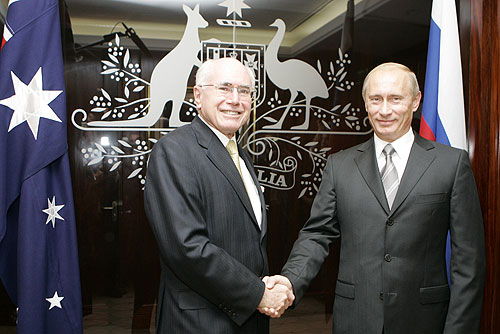Demonstrating conclusively that hers is ‘not a political party that shirks hard decisions’ (Julia Gillard), at its national conference this weekend Labor took a bold step and in The National Interest™ approved the sale of uranium to India.
This is obviously doubleplusgood news for the sunburnt country which, with perhaps 1/3 or moar of global uranium reserves, now can has jobs jobs jobs for working families working families working families for at least the next 703,800,000 years or so.
Among those who deserve praise for their courageous defence of the right to sell things is Bennelong Society medallist and former ALP President Warren Mundine. Mundine also happens to be a director of the Australian Uranium Association, “the advocacy body that represents the uranium industry exclusively. We argue for policy change that will let uranium compete on its merits as an energy source appropriate for the needs of the twenty first century.”
The meritorious decision to sell uranium to India has naturally been welcomed by Mundine’s friends in the uranium mining industry, although the Association does sound a warning, noting that sales-wise the corporate sector will be forced to compete with uranium mined in places like Kazakhstan. Thus:
The economic potential of a uranium trade relationship with India is considerable. Based on India’s projected nuclear growth, and Australia’s current share of world uranium exports, Australia could expect to sell around 2,500 tonnes of uranium a year to India by 2030. On current values, these exports would be expected to generate around AUD300 million in export sales.
Sales of this value were by no means guaranteed. “India already has access to uranium from countries who are competitors of ours, such as Kazakhstan. Australia will have to work hard to ensure we can compete with countries that already have uranium trading relationships with India,” [AUA CEO] Mr Angwin said.

Of course, the deal to sell uranium to India has been on the cards for some time now: in fact, since George II decided it was kosher back in 2005 (‘U.S.–India Civil Nuclear Agreement’). Formal agreement between the Australian and Indian states, however, was seemingly not made public until the CHOGM meeting in Perth last month (with receipt of the final rubber-stamp being delayed until the conference).
The decision is also a fulfilment of the HoWARd Government’s 2007 promise to sell uranium to India.
The difficult question of digging things up and then selling them was also happily resolved by former PM John HoWARd when he made a similar deal with Vladimir Putin.
The decision to sell uranium to Russia was cemented over the dead body of Russian anarchist Ilya Borodaenko, murdered in July 2007 by neo-Nazi thugs (‘hooligans’ in the lexicon of the Russian state) at the behest of local authorities, keen to destroy the environmental camp which Ilya had joined and which had been established at Angarsk, a small industrial town in south-eastern Siberia, established in 1948, and home to The International Uranium Enrichment Centre.

The Indian state has itself an enviable record of dealing with criminals like Borodaenko, with an estimated 14,231 custodial deaths from 2001 to 2010. According to the New Delhi-based trouble-making anti-Indian association the Asian Centre for Human Rights (PDF): “A large majority of these deaths are a direct consequence of torture in custody. But these no way reflect the extent of torture in India. These deaths as reported to the NHRC reflect only a fraction of the menace of torture and custodial deaths in India.”
See also : Arundhati Roy on Obama’s Wars, India and Why Democracy Is “The Biggest Scam in the World”, Democracy Now, March 22, 2010.
After having earlier (July 2009) approved the Four Mile uranium project (while Minister for the Environment, Heritage and the Yartz), former pop singer and environmental activist Peter Garrett made the following remarks to the ALP conference:
…I conclude by saying this: I know that there are differences of opinion here, differences both within factions and within the party; but Labor has a great disarmament tradition.
That’s why I’m here. A great disarmament tradition – of course I’d like to see it strengthened.
Where is our vision here? Where is our commitment to a nuclear free future?
Where is our commitment to things like a nuclear weapons free convention?
And where is our insistence that those values that we’ve stood for in the past, and those measures that we’ve considered were absolutely crucial to disarmament, should be maintained?
On that basis delegates, we should oppose this motion.
D’oh!
